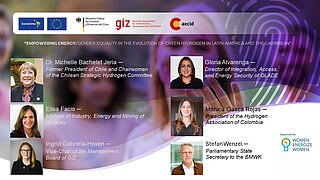Empowering Energy: Gender Equality In The Evolution Of Green Hydrogen In Latin America And The Caribbean
Women leaders from Latin America and Europe meet at Berlin Energy Transition Dialogue to Promote Green Hydrogen Industry with a Gender Focus
18 March, Berlin, Germany. ”Empowering Energy: Gender Equality In The Evolution Of Green Hydrogen In Latin America And The Caribbean”, was the event held in the framework of the Berlin Energy Transition Dialogue 2024 (BETD), one of the most important forums in the world on the promotion of renewable energies.
Speakers included Michelle Bachelet, former President of Chile and Chairwomen of the Chilean Strategic Hydrogen Committee; Elisa Facio, Minister of Industry, Energy and Mining of Uruguay; Katrin Uhlig, Member of the Bundestag; Sabine Amirdschanjan, representative of the European Union; Ingrid Hoven, Director of GIZ Germany; and Gloria Alvarenga, Director of Integration, Access and Energy Security of OLADE.
The event was opened by Stefan Wenzel, Parliamentary State Secretary of the German Federal Ministry of Economics and Climate Action (BMWK), noting that the ministry "actively collaborates with a large number of women’s networks and organisations, transfers knowledge and connects female experts to attract, retain and enhance female talents in the renewable sector."
Sabine Amirdschanjan, representative of the European Union, explained that the promotion of the new green hydrogen industry had to consider inclusion and a gender perspective in the hydrogen value chain. “Furthermore, we have the opportunity to contribute to a just energy transition and to tackle energy poverty both in Chile and in the European Union”, she added.
Then former President Bachelet, who was the keynote speaker, argued that the energy industry was at a key moment to facilitate the incorporation of more women on equal terms with men and thus advance gender equality. Bachelet stated that an emerging industry, where there is a lot of room to do new things in a different way, was the ideal space to make this leap. It was also well proven that diversity brings creativity and innovation. This would not only benefit women, but certainly the industry and society as a whole. “
Elisa Facio, Uruguay's Minister of Industry, Energy and Mining, said that “the energy transition is also an opportunity to incorporate more women in these spaces of great innovation and creativity seeking solutions for our present and future, in this task, making female leadership visible is key. Women leaders convince and attract more young talents, ensuring the changes we need.”
Ingrid-Gabriele Hoven, Vice-Chairwoman of the Board of the Deutsche Gesellschaft für Internationale Zusammenarbeit (GIZ), commented that we were learning much along the way. It did matter where, how and by whom the infrastructure of a new hydrogen market is built. She added that we needed to strengthen networks and make sure that women's voices are heard, in the sector and beyond. To really achieve parity at all levels, the rules of the game would also need to be partly changed.
Then Katrin Uhlig, member of the Bundestag, asked how the presented examples of women's participation in the energy sector can be expanded: "From the experience in Chile, I take away that when you include gender diversity from the beginning in something like a Hydrogen Strategy, it normalises this aspect. We women have to allow ourselves to try new things and trust that there is a network that wants us to thrive".
Watch "Empowering Energy: Gender Equality In The Evolution Of Green Hydrogen In Latin America And The Caribbean"

Cooperation partner
The “Team Europe Renewable Hydrogen Development” project, implemented by GIZ in Chile and co-financed by Team Europe of the EU Comission and the Federal Ministry of Economy and Climate Action (BMWK) of Germany, together with the Ministry of Energy of Chile and the Latin American Energy Organization OLADE, had invited to a dialogue on gender gaps and barriers in the emerging green hydrogen industry and its derivatives. This initiative seeks to address these issues at the regional level, sharing success stories and learnings for possible replicability in the LAC region. We will focus on one of the missing links to materialize the energy transition with low carbon emissions: gender equality in the development of green hydrogen.
More information
Initiative "Energía Mas Mujer(es)” of the Chilean Energy Ministry